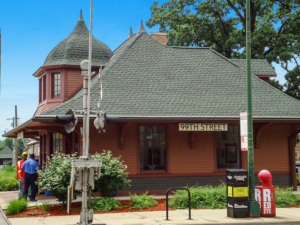



You, the author of a blog post, letter, newspaper article, novel…will set your work in a certain time. And, as your words come onto the page, you will also find your words, ideas echoing and becoming a part of PLACE. Because…
WRITING IS ALWAYS ABOUT PLACE
Louise Erdrich, author of THE PLAUGE OF DOVES, writes:
In a tribal view of the world, where one place has been inhabited for generations, the landscape becomes enlivened by a sense of group and family history. …a traditional storyteller fixes listeners in an unchanging landscape combined of myth and reality. People and place are inseparable.
I LOVE THAT LAST SENTENCE: “People and place are inseparable.”
It underlines for me why one of my novels takes place in a northside neighborhood of Chicago, a crowded older area abutting the shores of Lake Michigan, probably Rogers Park. It’s where I lived while in college. I attach the word probably, because novel writing allows imagination to alter things. When one of my characters fights to stay in her home, argues that the move her husband desires is not good for their family, I’m allowed to envision my childhood home, a street lined with elm trees on the southside of Chicago, a place where hopscotch squares filled the sidewalks and a bike was the imaginary pony you rode around familiar city blocks:
She ran, feet slapping on sidewalks, one cement square worn, another fractured with prickly weeds breaking through, the straight-on Chicago blocks of this Near North Side neighborhood. Step on a crack? Break your mother’s back. …Change endemic to living, and it happening here, block after block, street after street, yet the place still familiar, like lines on her palms…
And if our characters are formed by place, they can also alter place, Erdrich being right: people and place are inseparable. I can sit at my computer in Southern California or in Des Moines Iowa and unite myself once again with the sensory experience of that part of my life.
A CHALLENGE: CHANGE Versus IMMUTABILITY
But because most of us are American writers, Erdrich’s essay presents a challenge, asks that we compare her beginnings, her native culture, with our modern one. Because in our culture, if we are not satisfied with the landscape, we will eventually use our power to alter it. This despite the fact that the land has always depended on us for protection. Erdrich writes:
As we know, neighborhoods are leveled in a day, the Army Corps of Engineers may change the course of a river. In the ultimate kitsch gesture of culture’s desperation to engrave itself upon an alien landscape, a limestone mountain may be blasted into likenesses of important men.
Yes, a major aspect of Western culture is its mutability, that nothing, not even the land where we live and the work we do stays the same, so that Erdrich can write: . …it is therefore, as if, in the very act of naming and describing what they love, they lose it. And she supports this thesis using literature.
Take Faulkner’s “The Bear,” a story set in a wilderness that is doomed to disappear: …gnawed at by men with plows and axes who feared it because it was wilderness. Yes, the pioneers felt the need to find the land, name that land and then consume it, tame it, using more and more modern farming methods that did irrevocably change it.
When Erdrich states that the course of a river can be changed by the Army Corps of Engineers, she wonders if our suburbs and suburban life may be more sustaining and representative of monuments than Mount Rushmore. WOW!
Though we might all believe we know what a suburb is, each writer’s interpretation of that particular place challenges a bland interpretation, welcomes readers to the oddity of place, capturing the reader’s attention and sustaining it. Basic tenant: not all suburbs are the same.
WRITING ROOTS
But there is a true and real challenge in Erdrich’s analysis of American literature and how it considers place:
…there still remains the problem of identity and reference. An author needs his or her characters to have something in common with the reader. If not the land, which changes, if not a shared sense of place, what is it then that currently provides a cultural identity?
In her own work, Erdrich answers this question by going back to her tribal roots, telling in different ways the stories that are part of her heritage, stories she first heard in her Tewa language. There is a story of the Tewa Pueblo. It begins in complete darkness, changes when a mole visits and leads the people above ground where light is blinding.
At the telling of it we would be lifetime friends…Old people would nod when parts were told…It would be a new story and an old story, a personal story and a collective story, to each of us listening.
Erdrich also quotes Eudora Welty, who begs for some permanence to sustain society and thus our fiction:
It is only too easy to conceive that a bomb that could destroy all traces of places as we know them, in life and through books, and could also destroy all feelings as we know them, so irretrievably and so happily are recognition, memory, history, valor, love, all the instincts of poetry and praise, worship and endeavor, bound up in place.
The ability to read a poem, watch a film, or even see a film clip of a news event, can mean more and might stay with us, if there is recognition of PLACE –either that specific place, or in fiction, one that haunts, brings back memories, places you on a sidewalk broken with weeds or pulls you in so for those seconds you are reading, your subconscious is whispering: Here I am, and though I am frightened, or repulsed or angry, or joyful, this is where I want to be.
BEGINNINGS
Yes, we all start in a place, and often we take that place into our hearts when we move or leave our beginnings. But they stay with us. In airplanes we can escape gravity, but when we look down, we cannot escape the need to identify with some place on this earth–a place either big or small that rises up to hold us, so that we know we belong, somewhere. In a society where people travel widely, or are uprooted, either out of desire or the necessity to survive, writing can reflect a disconnect to place or a strong bond—but always a variety of complicated and emotional relationships to that place and the memory of that place.
Though reading a work of fiction can pull you into another world, that story will not resonate, will not hold you, if there isn’t something within the tale that you have already felt or experienced. There must be a touchstone to your reality, an experience to keep you reading: the Chicago sidewalk, the New York skyline, the struggle of the hero, the strength of the heroine, the sorrow or joy that ends the tale. The emotional references that Erdrich makes to our land should inspire all of us when we write.
We can escape gravity itself, and every semblance of geography, by moving into sheer space, and yet we cannot abandon our need for reference, identity or our pull to landscapes that mirror our most intense feelings.
When you first begin to write, do you have visions of place—a world that can be as big as universe or as small as a single room? Because place is where we begin.

4 Responses
This is definitely food for thought
Thanks for reading, Carol.
I love the use of setting in a novel. It almost becomes a character in itself, whether from the Long Island mansions of “The Great Gatsby” or Harlem streets in “Go Tell it on the Mountain.” Place is inescapable and fascinating.
Totally agree. Sometimes the setting makes the story and becomes more interesting than some of the characters.